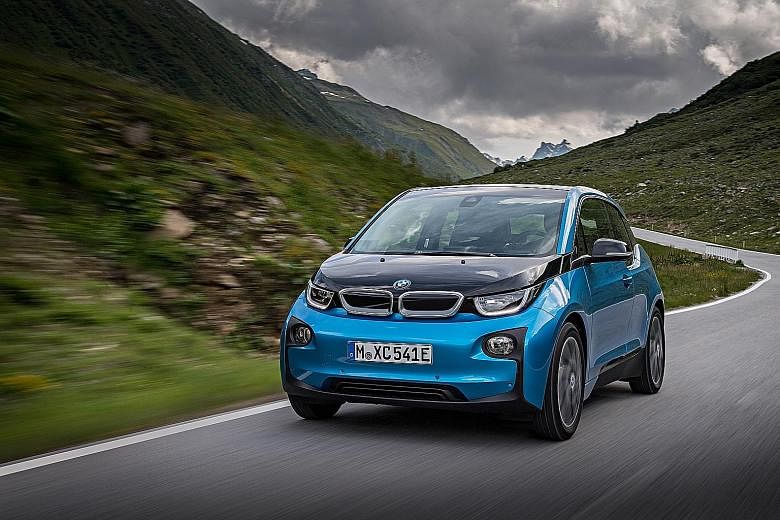BMW is giving its bug-like i3 electric car a sporty makeover to boost its appeal and counter Tesla Inc as the German carmaker prepares to roll out battery-powered versions of its mainstream line-up.
The updated i3 features a wider track and elongated front end, making it appear less squat.
The back end will be less boxy and the roof slopes slightly towards the rear.
From November, the city car's line-up will be expanded with a sporty version that boasts a top speed of 160kmh, the Munich- based manufacturer said in a statement.
The US$44,450 (S$60,400) i3 has struggled to lure buyers since its debut in 2013, as consumers baulked at its high cost, limited driving range and unusual design.
Competition has since intensified with Tesla's new US$35,000 Model 3 sedan starting initial deliveries last month with a lower price and longer range.
To become more competitive, BMW is gearing up to roll out electric versions of the X3 SUV and Mini by the end of the decade.
The new version of the i3 will feature optional driver assistance systems such as adaptive cruise control and a feature to help from drifting into another lane, but the changes won't improve range.
The car will still only be able to drive about 160km per charge and 290km including a so-called range extender - a small petrol-powered motor that generates electricity.
By comparison, Tesla's Model 3 has a range of 350 to 500km.
Despite the slow start, demand for the i3 has picked up, with more than 25,500 sales last year. Since its 2013 debut, BMW has delivered slightly more than 83,000 i3 cars.
The pressure to boost sales of electric cars has intensified in the two years since Volkswagen's diesel- cheating scandal erupted. The crisis has weighed on demand for the vehicles, which were key for meeting tighter environmental rules kicking in next decade.
Meanwhile, Chancellor Angela Merkel's chief of staff said last Saturday that German carmakers must invest more in electric vehicles and take on Elon Musk's Tesla.
Chief of staff of the German Chancellery Peter Altmaier said he was thoroughly disappointed by German auto executives following the diesel-emissions scandal and that he was also thinking about the future of the 600,000 employees in the industry.
"When is our automobile industry, which is so good, actually going to be in a position to build a car that travels 50km further than a Tesla and costs €10,000 (S$16,170) less?" Mr Altmaier said at a public forum in Berlin last Saturday.
"It must be possible to set this as a goal."
He referred to Tesla cars costing US$100,000 with a range of 400km.
Tesla's Germany website shows a Model X Tesla with a range of as much as 417km selling for €91,250.
Tesla has added a more affordable vehicle, the Model 3 sedan, which starts at US$35,000, with initial deliveries in July.
"If the automobile industry doesn't grasp the fact that it has to invest more in electric vehicles, especially in cities, then it will be very hard to defend combustion engines - petrol and diesel - over the long term," Mr Altmaier said.
"We must do all we can now so that the best electric cars are built in Germany."
In the wake of Volkswagen's emissions cheating, the future of diesel cars is a campaign issue in Germany's national election on Sept 24.
Dr Merkel and her main opponent, Social Democrat Martin Schulz, have criticised auto executives for jeopardising the industry's future, while saying they want to avoid driving bans that courts are considering in response to pollution complaints.
Volkswagen, Daimler and BMW reached a deal with the government this month to upgrade five million newer diesel cars and offer trade-in incentives on older models, but this has not eliminated concern about emission levels.
Car buyers have been slow to purchase all-electric models due to concerns about how far the vehicles can travel on a fully charged battery, prices and the time needed to recharge.
Dr Merkel conceded in May that Germany would not meet her goal of having one million electric cars on the country's roads by 2020.
Among German manufacturers, only BMW currently offers an electric car, the i3, that is not based on a combustion-engine car.
Daimler's Mercedes-Benz brand and Volkswagen outlined plans a year ago to produce all-new battery-only models by the end of the decade to challenge Tesla.
BLOOMBERG

